

Healthcare scientist, medical physics: Job description. Healthcare scientists working in medical physics apply physics and technical skills to the practice of medicine to help prevent, diagnose and treat many kinds of diseases and health conditions.

They research, develop and test specialist equipment used by medical staff in many areas including radiotherapy, ultrasound, nuclear medicine, laser technology and physiological monitoring. The majority of healthcare scientists (also known as clinical scientists) working in medical physics are employed in the National Health Service (NHS) and play a central role in developing, planning and implementing patient treatment programmes. They work closely with other healthcare professionals, for example doctors and radiotherapists. However, others are employed in medical equipment manufacturing companies, regulatory authorities, universities, research organisations and companies using radioactive materials.
Medical physicist: job description. Medical physicists use analytical and applied scientific techniques to assist healthcare workers in the safe diagnosis and treatment of patients.
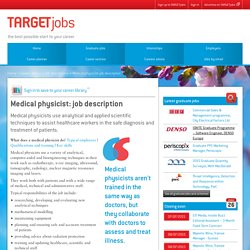
What does a medical physicist do? Typical employers | Qualifications and training | Key skills Medical physicists use a variety of analytical, computer-aided and bioengineering techniques in their work such as radiotherapy, x-ray imaging, ultrasound, tomography, radiology, nuclear magnetic resonance imaging and lasers. They work both with patients and with a wide range of medical, technical and administrative staff. Typical responsibilities of the job include: researching, developing and evaluating new analytical techniques mathematical modelling maintaining equipment planning and ensuring safe and accurate treatment of patients providing advice about radiation protection training and updating healthcare, scientific and technical staff managing radiotherapy quality assurance programmes writing reports teaching laboratory management. Medical physicist Job Information.
Page Content Medical physicist Hours37.5 per weekStarting salary£25,000 + per year As a medical physicist, you would work as a specialist in healthcare science (also known as clinical science).
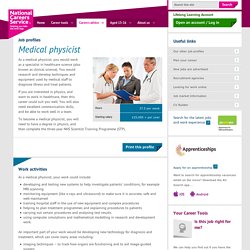
Planit : Job Profiles : Medical Physicist Medical Technology. Medical physicists use science and engineering technology to develop, design and evaluate medical equipment and procedures, including radiotherapy, laser technology and imaging techniques such as x-rays.
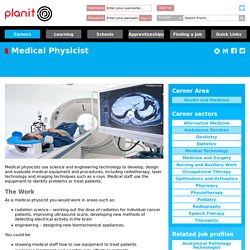
Medical staff use the equipment to identify problems or treat patients. The Work As a medical physicist you would work in areas such as: radiation science – working out the dose of radiation for individual cancer patients, improving ultrasound scans, developing new methods of detecting electrical activity in the brain engineering – designing new biomechanical appliances. You could be: Pay As a specialist medical physicist working in the NHS on you would start off on Band 6, £26,302 to £35,225 a year.
IPEM > Careers & Training. Why choose this career?
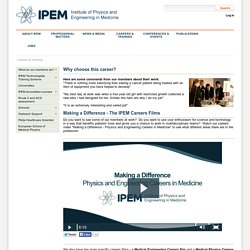
Here are some comments from our members about their work: "There is nothing more satisfying than seeing a cancer patient being treated with an item of equipment you have helped to develop" "My best day at work was when a four year old girl with restricted growth collected a new bike I had designed for her. Smiles like hers are why I do my job" "It is an extremely interesting and varied job" Making a Difference - The IPEM Careers Films Do you want to see some of our members at work?
We also have two more specific careers films - a Medical Engineering Careers film and a Medical Physics Careers film, which can be used in outreach activities where the focus is on one area rather than providing an overview. What stage are you at? If you want to get into the profession and some advice on how to best achieve this please see our summary below. At school / doing A-Levels - at this point you should: At university / doing an undergraduate or MSc degree - at this point you should: Physical sciences and biomechanical engineering. Health Careers. Frequently Asked Questions. How do I get into Medical Physics or Biomedical Engineering?
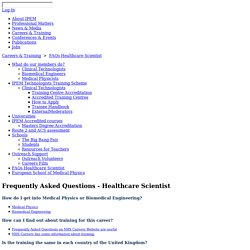
How can I find out about training for this career? Is the training the same in each country of the United Kingdom? England The Scientist Training Programme (STP) for Medical Physicists and Biomedical Engineers in England is supported and facilitated by the National School for Healthcare Scientists. Once training is successfully completed the Academy for Healthcare Science awards Certificates of Equivalence and Attainment. Further information on the above organisations can be found at these links: Scotland Supernumerary Clinical Scientist trainees are NHS employed on a postgraduate-level scheme to develop competences necessary to meet the Health and Care Professions Council requirements. Scottish Trainees have equivalent learning outcomes to ensure UK-compatibility under modernised framework.
Wales Wales mirrors that of the NHS England. Northern Ireland Plans to recruit clinical scientists in Northern Ireland are under review. British Institute of Radiology homepage - British Institute of Radiology. BNMS - Home. Home. Institute of Physics - For physics. Physicsworld.com homepage.